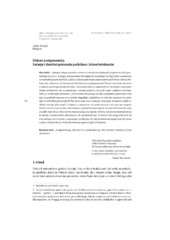Diskurs postgeneracije. Sećanje i identitet potomaka počinilaca i žrtava holokausta
Discourse of the Postgeneration. Remembrance and Identity of the Descendants of the Perpetrators and the Victims of the Holocaust
Апстракт
By analyzing the role of the family in the process of inter/transgenerational inheritance of trauma and memory (remembrance), the paper is an attempt at providing an answer to how the un-experienced past affects the lives of the descendants of the direct perpetrators and victims of the Holocaust, or rather, how it affects the identity forming of the so-called postgeneration. As the temporal distance from the Second World War increases, and as the number of those with immediate experiences and memories decreases, the expressions like memory and remembrance begin to lose their conventional meaning. As the research shows, even with the lack of first-hand experience, the descendents of those who survived mass traumatic events are subjectively deeply attached to the memory of the previous generation (so much so that they label that attachment as remembrance, and they feel their parents’ traumas as their own). Given the fact that it is not possible to physically transfer the trauma and memor...y to descendants, the paper analyzes and compares the terminology that the professional literature has adopted so far, i.e. secondary traumatization (in case of a child), tertian traumatization (in case of a grandchild), as well as echoes of the trauma and postmemory. The main thesis of this paper is that echoes of the memory and echoes of the trauma cause the so-called identity crisis of the Holocaust postgeneration, that is, only facing the past leads to postgeneration’s coming to terms with it.
Кључне речи:
Holocaust / trauma / remembrance / memory / postgenerationИзвор:
Filozofija i društvo/Philosophy and Society, 2012, 78-90Колекције
Институција/група
IFDTTY - JOUR AU - Matejić, Julija PY - 2012 UR - http://rifdt.instifdt.bg.ac.rs/123456789/422 AB - By analyzing the role of the family in the process of inter/transgenerational inheritance of trauma and memory (remembrance), the paper is an attempt at providing an answer to how the un-experienced past affects the lives of the descendants of the direct perpetrators and victims of the Holocaust, or rather, how it affects the identity forming of the so-called postgeneration. As the temporal distance from the Second World War increases, and as the number of those with immediate experiences and memories decreases, the expressions like memory and remembrance begin to lose their conventional meaning. As the research shows, even with the lack of first-hand experience, the descendents of those who survived mass traumatic events are subjectively deeply attached to the memory of the previous generation (so much so that they label that attachment as remembrance, and they feel their parents’ traumas as their own). Given the fact that it is not possible to physically transfer the trauma and memory to descendants, the paper analyzes and compares the terminology that the professional literature has adopted so far, i.e. secondary traumatization (in case of a child), tertian traumatization (in case of a grandchild), as well as echoes of the trauma and postmemory. The main thesis of this paper is that echoes of the memory and echoes of the trauma cause the so-called identity crisis of the Holocaust postgeneration, that is, only facing the past leads to postgeneration’s coming to terms with it. T2 - Filozofija i društvo/Philosophy and Society T1 - Diskurs postgeneracije. Sećanje i identitet potomaka počinilaca i žrtava holokausta T1 - Discourse of the Postgeneration. Remembrance and Identity of the Descendants of the Perpetrators and the Victims of the Holocaust SP - 78 EP - 90 DO - 10.2298/FID1203078M ER -
@article{
editor = "Milidrag, Predrag",
author = "Matejić, Julija",
year = "2012",
abstract = "By analyzing the role of the family in the process of inter/transgenerational inheritance of trauma and memory (remembrance), the paper is an attempt at providing an answer to how the un-experienced past affects the lives of the descendants of the direct perpetrators and victims of the Holocaust, or rather, how it affects the identity forming of the so-called postgeneration. As the temporal distance from the Second World War increases, and as the number of those with immediate experiences and memories decreases, the expressions like memory and remembrance begin to lose their conventional meaning. As the research shows, even with the lack of first-hand experience, the descendents of those who survived mass traumatic events are subjectively deeply attached to the memory of the previous generation (so much so that they label that attachment as remembrance, and they feel their parents’ traumas as their own). Given the fact that it is not possible to physically transfer the trauma and memory to descendants, the paper analyzes and compares the terminology that the professional literature has adopted so far, i.e. secondary traumatization (in case of a child), tertian traumatization (in case of a grandchild), as well as echoes of the trauma and postmemory. The main thesis of this paper is that echoes of the memory and echoes of the trauma cause the so-called identity crisis of the Holocaust postgeneration, that is, only facing the past leads to postgeneration’s coming to terms with it.",
journal = "Filozofija i društvo/Philosophy and Society",
title = "Diskurs postgeneracije. Sećanje i identitet potomaka počinilaca i žrtava holokausta, Discourse of the Postgeneration. Remembrance and Identity of the Descendants of the Perpetrators and the Victims of the Holocaust",
pages = "78-90",
doi = "10.2298/FID1203078M"
}
Milidrag, P.,& Matejić, J.. (2012). Diskurs postgeneracije. Sećanje i identitet potomaka počinilaca i žrtava holokausta. in Filozofija i društvo/Philosophy and Society, 78-90. https://doi.org/10.2298/FID1203078M
Milidrag P, Matejić J. Diskurs postgeneracije. Sećanje i identitet potomaka počinilaca i žrtava holokausta. in Filozofija i društvo/Philosophy and Society. 2012;:78-90. doi:10.2298/FID1203078M .
Milidrag, Predrag, Matejić, Julija, "Diskurs postgeneracije. Sećanje i identitet potomaka počinilaca i žrtava holokausta" in Filozofija i društvo/Philosophy and Society (2012):78-90, https://doi.org/10.2298/FID1203078M . .



